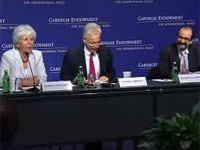Registration
You will receive an email confirming your registration.
In a panel organized by the Carnegie Endowment for International Peace, former Palestinian negotiator Ghaith al-Omari and Carnegie Middle East expert Nathan J. Brown discussed Brown’s new report “Sunset for the Two-State Solution?” in which he argues that the current U.S. approach to the Israeli–Palestinian conflict actually further undermines the chances for a two-state solution. Rather than pretending that an agreement is possible now, it would be far better if U.S. efforts in the remainder of this calendar year began to address the underlying problems. Marina Ottaway, director of the Carnegie Middle East program, moderated the discussion.
Brown suggested that there are two types of obstacles presently undermining the two-state solution. The first, which includes the settlements and checkpoints, is physical. The second, which precludes the emergence of a credible and legitimate Palestinian leadership, is institutional. The U.S. policy is currently focused on building a healthy paradigm in the West Bank, which would in turn provide a concrete incentive for Gazans to reject Hamas. It is not clear whether this policy is viable, especially because it does not address the question of how exactly Hamas can be forced out of the political equation. In view of all that, the future of the two-state option seems to be very uncertain.
Needless to say, the alternatives to the two-state solution are not sensible. The one-state solution is a utopian option that is not implementable in practice. Maintaining the status-quo is a volatile arrangement that is not sustainable in the long run. And finally, based on previous experience, the Israeli military solution is likely to result in greater instability.
The reinforcement of the two-state solution should be predicated on eliminating the physical obstacles that stand in its way, and on transforming the Palestinian Authority into a viable and credible representative body. The first step can be achieved by reversing Israeli entrenchment in the West Bank, and the second can be achieved through elections.
Al-Omari argued that the two-state option has yet to recover from the setback of the second Camp David summit. He suggested that a reexamination of what constitutes an ideal resolution to the Palestinian-Israeli conflict is the exigency at hand. In this respect, he argued that Palestinian national unity should no longer be viewed as a precondition for a lasting peace settlement.
A final solution by the end of this year is unlikely to succeed. Instead, what is needed is a stable transition period. This entails a gradual de-escalation in the Gaza strip and an end to collective economic policies against its inhabitants. It also requires building up President Abbass’s ability to deliver political and economic gains to his people.
Al-Omari ended with an optimistic note, saying that there are too many political and economic interests involved in the Palestinian-Israeli arena, and that these interests constitute a considerable force that will ultimately push the peace process forward.
Marina Ottaway asked whether recent conflagrations in Lebanon and progress in the Israeli-Syrian track have any effects on the Palestinian-Israeli process. Brown said that these developments distract Palestinian and Israeli decision makers. Nevertheless, the real development is the declining role of the U.S. in regional diplomacy. This development manifests itself in the growing diplomatic roles of countries like Egypt and Turkey. Al-Omari said that he is not very concerned about the Syrian track, at least under the current administration. The Syrians want specific concessions from the U.S. that the Bush administration is not willing to give. He added that the developments in Lebanon reflect the growing role of Iran in the region.
Audience members asked about the likelihood of a future federation between Palestine and Israel. Brown and Al-Omari were skeptical about that possibility and suggested that both Israelis and Palestinians are interested in complete separation.
